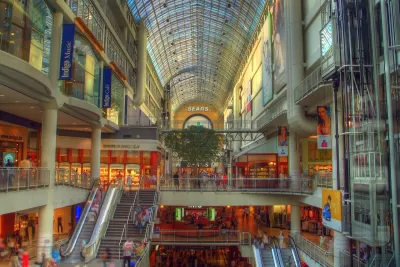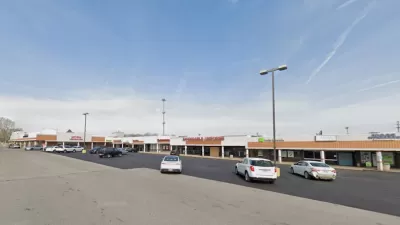Despite threats like online retail, upscale sectors of the mall market are prospering. This is good news for what are, perhaps, the only walkable 'streets' in some parts of the country.

Some shopping malls are closing, but many more remain entirely viable. Amanda Kolson Hurley reports on the specifics. "Most malls are owned by a handful of publicly traded real-estate investment trusts (REITs), and the big players who specialize in higher-end malls are doing well. The top three—Simon Property Group, General Growth Properties, and Macerich—have seen their stock prices rise since 2012."
To succeed today, malls need to be interesting. And they do that by projecting affluence and "lifestyle" options. From the article: "Meanwhile, malls are working hard to drum up more foot traffic. Increasingly, higher-end shopping malls peddle an experience, not just goods. They have real restaurants and cafes instead of wan food-court fare, ritzy salons, and maybe a Whole Foods where a department store used to be."
Counter-intuitively, any real loss of public interest in mall spaces may not be a good thing: "Urbanists like to think that the American mall is a relic. But the truth is that until more suburbs redevelop to become denser and walkable, the mall is the best communal—though not really public, alas—space that we've got."
FULL STORY: Shopping Malls Aren't Actually Dying

Planetizen Federal Action Tracker
A weekly monitor of how Trump’s orders and actions are impacting planners and planning in America.

Restaurant Patios Were a Pandemic Win — Why Were They so Hard to Keep?
Social distancing requirements and changes in travel patterns prompted cities to pilot new uses for street and sidewalk space. Then it got complicated.

Map: Where Senate Republicans Want to Sell Your Public Lands
For public land advocates, the Senate Republicans’ proposal to sell millions of acres of public land in the West is “the biggest fight of their careers.”

Maui's Vacation Rental Debate Turns Ugly
Verbal attacks, misinformation campaigns and fistfights plague a high-stakes debate to convert thousands of vacation rentals into long-term housing.

San Francisco Suspends Traffic Calming Amidst Record Deaths
Citing “a challenging fiscal landscape,” the city will cease the program on the heels of 42 traffic deaths, including 24 pedestrians.

California Homeless Arrests, Citations Spike After Ruling
An investigation reveals that anti-homeless actions increased up to 500% after Grants Pass v. Johnson — even in cities claiming no policy change.
Urban Design for Planners 1: Software Tools
This six-course series explores essential urban design concepts using open source software and equips planners with the tools they need to participate fully in the urban design process.
Planning for Universal Design
Learn the tools for implementing Universal Design in planning regulations.
Heyer Gruel & Associates PA
JM Goldson LLC
Custer County Colorado
City of Camden Redevelopment Agency
City of Astoria
Transportation Research & Education Center (TREC) at Portland State University
Camden Redevelopment Agency
City of Claremont
Municipality of Princeton (NJ)





























